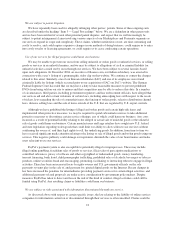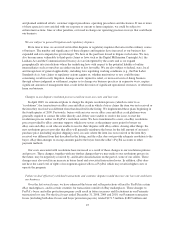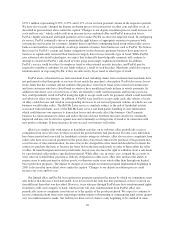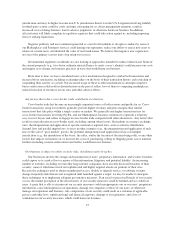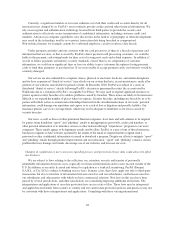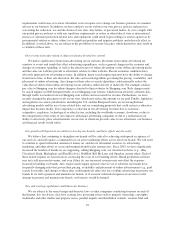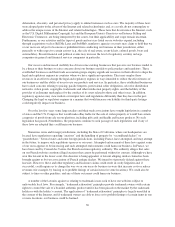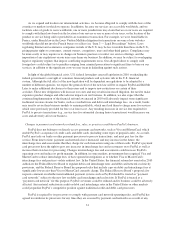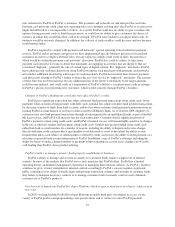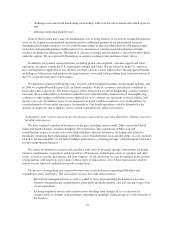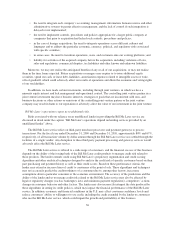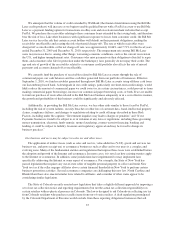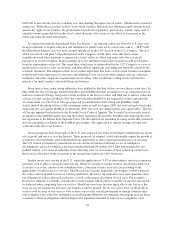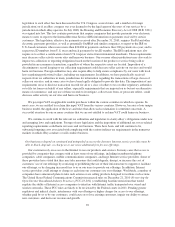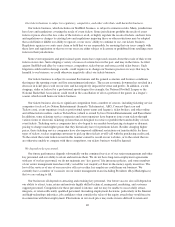eBay 2010 Annual Report Download - page 36
Download and view the complete annual report
Please find page 36 of the 2010 eBay annual report below. You can navigate through the pages in the report by either clicking on the pages listed below, or by using the keyword search tool below to find specific information within the annual report.As we expand and localize our international activities, we become obligated to comply with the laws of the
countries or markets in which we operate. In addition, because our services are accessible worldwide, and we
facilitate sales of goods to users worldwide, one or more jurisdictions may claim that we or our users are required
to comply with their laws based on the location of our servers or one or more of our users, or the location of the
product or service being sold or provided in an ecommerce transaction. For example, we were found liable in
France, under French law in the Louis Vuitton Malletier litigation for transactions on some of our websites
worldwide that did not involve French buyers or sellers (see “Item 3 — Legal Proceedings” below). Laws
regulating Internet and ecommerce companies outside of the U.S. may be less favorable than those in the U.S.,
giving greater rights to consumers, content owners, competitors, users and other third parties. Compliance may
be more costly or may require us to change our business practices or restrict our service offerings, and the
imposition of any regulations on our users may harm our business. In addition, we may be subject to overlapping
legal or regulatory regimes that impose conflicting requirements on us. Our alleged failure to comply with
foreign laws could subject us to penalties ranging from criminal prosecution to significant fines to bans on our
services, in addition to the significant costs we may incur in defending against such actions.
In light of the global financial crisis, U.S. federal lawmakers enacted legislation in 2010 overhauling the
federal government’s oversight of consumer financial products and systemic risk in the U.S. financial
system. Although the full effect of the new legislation will be dependent on regulations to be adopted by a
number of different agencies, we expect the general effect of the new law will be to require PayPal and Bill Me
Later to make additional disclosures to their users and to impose new restrictions on certain of their
activities. These new obligations will increase our costs and may result in increased litigation, the need to make
expensive product changes and other adverse impacts on our business. In addition, we also expect that the
continued implementation of the financial reform law enacted in 2010 will adversely impact some significant
traditional revenue streams for banks, such as overdraft fees and debit card interchange fees. As a result, banks
may need to revise their business models to remain profitable, which may lead them to charge more for services
which were previously provided for free or at lower cost. Any resulting increases in service fees required for
PayPal to process transactions (e.g., service fees for automated clearing house transactions) would increase our
costs and adversely affect our business.
Changes to payment card networks or bank fees, rules, or practices could harm PayPal’s business.
PayPal does not belong to or directly access payment card networks, such as Visa and MasterCard, which
enable PayPal’s acceptance of credit cards and debit cards (including some types of prepaid cards). As a result,
PayPal must rely on banks or other payment processors to process transactions, and must pay fees for this
service. From time to time, payment card networks have increased, and may increase in the future, the
interchange fees and assessments that they charge for each transaction using one of their cards. PayPal’s payment
card processors have the right to pass any increases in interchange fees and assessments on to PayPal as well as
increase their own fees for processing. Changes in interchange fees and assessments could increase PayPal’s
operating costs and reduce its profit margins. In addition, in some markets, governments have required Visa and
MasterCard to reduce interchange fees, or have opened investigations as to whether Visa or MasterCard’s
interchange fees and practices violate antitrust law. In the United States, the financial reform law enacted in 2010
authorizes the Federal Reserve Board to regulate debit card interchange rates and debit card network exclusivity
provisions, and the Federal Reserve Board has proposed rules that include caps on debit card interchange fees at
significantly lower rates than Visa or MasterCard currently charge. The Federal Reserve Board’s proposal also
requests comment on whether non-traditional payment systems such as PayPal should be treated as “payment
card networks” subject to the new law on debit card interchange and exclusivity. If PayPal is treated as a
“payment card network” for this purpose, PayPal’s revenues could be reduced and its business could be adversely
affected. Any material reduction in credit or debit card interchange rates in the United States or other markets
could jeopardize PayPal’s competitive position against traditional credit and debit card processors.
PayPal is required by its processors to comply with payment card network operating rules, and PayPal has
agreed to reimburse its processors for any fines they are assessed by payment card networks as a result of any
31




